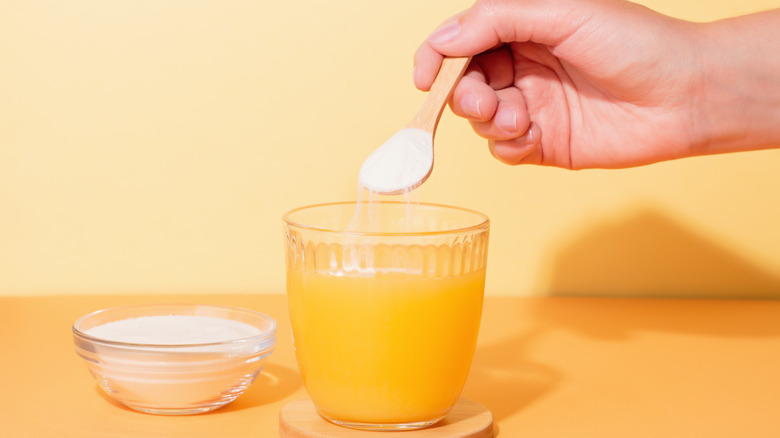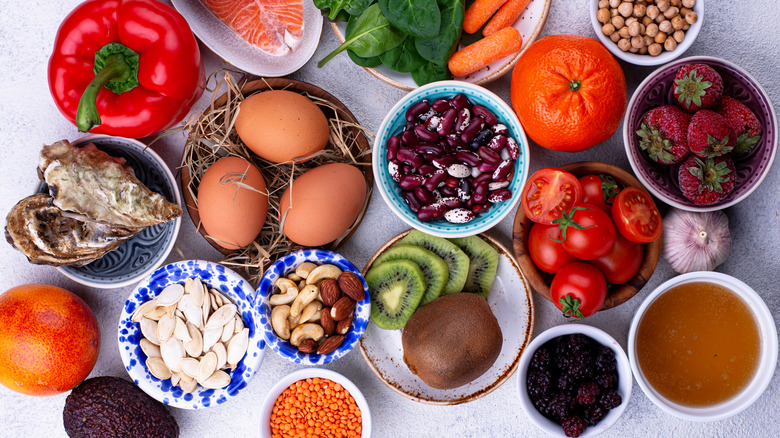Can Collagen Supplements Be Vegan?
The mythical fountain of youth has been romanticized in literature for centuries; a spring that magically restores youth to anyone that drinks or bathes in it. While historians and archaeologists can't confirm, we believe the fountain spouts hydrolyzed collagen supplements. Collagen is a protein, naturally produced by our bodies, that helps with skin elasticity, tissue repair, and joint health (via Healthline). Until our mid-twenties, we're all blessed with an abundance of this protein, making it easy to drink alcohol excessively, skip the sunscreen, and have an erratic sleep schedule — all factors that break the protein down (via Harvard School of Public Health).
However, as we approach our thirties, we begin to lose about 1% of our collagen every year (via British Journal of Dermatology). "This contributes to sagging and the appearance of wrinkles and fine lines," dermatologist Shari Marchbein explained to Forbes. Exposure to UV rays and habits like smoking can suddenly show up on our skin like it never did before. To aid bodies with this loss of collagen, many have turned to daily supplements. These usually contain hydrolyzed collagen, a broken-down version of the protein that is easily absorbed by our bodies, which comes from sources like animal tissues, eggshells, and fish scales (via The Kitchn). Many brands have also accommodated vegans and people with dietary restrictions by offering plant-based and vegan collagen supplement options. Read on to know if these are worth adding to your diet.
Vegan collagen isn't real collagen
According to Google Trends, searches for collagen supplements have steadily been increasing over the past decade, with 2018 and 2021 seeing major spikes. Coincidentally, veganism has seen an increase in subscribers in the same years; a report in 2017 showed that Americans who identified themselves as vegans increased by 600% from the previous year (via Plant Based News). Considering that the main ingredients in collagen supplements often come from animal tissue, vegans have opted for plant-based alternatives.
However, most experts will warn you not to. "Anything that is marketing itself as a 'vegan collagen' does not have collagen inside of it...That would be like saying, 'Go drink some vegan bone broth'—it is not ever going to be vegan. Collagen comes from cows, chickens, and fish," mindbodygreen's registered nutritionist Ashley Jordan Ferira said. "Let's go ahead and bust the mythical unicorn that is 'vegan collagen.' It doesn't exist." These supplements are usually made with ingredients that can boost natural collagen production in your body, like vitamin C and zinc. But do they work? "No one knows, honestly, but based on the ingredients involved, it would indicate they have overall benefits," says dermatologist Ava Shamban told Coveteur. "The tricky part is, ingesting these boosters and quantifying direct dermal benefits is not easy."
Include collagen boosting food in your diet
Vegan collagen supplements are most likely collagen boosters, so you'll find a variety of vitamins and minerals that will definitely do more good than bad. However, you could also include certain foods in your diet regularly for the same effect. Collagen synthesis requires vitamin C, zinc, proline, glycine, and copper, per WebMD. Your grocery cart should have a little bit of each. Citrus fruits, peppers, berries, and other vegetables are rich in vitamin C. Include cabbage and mushrooms for proline, chickpeas, nuts and lentils for zinc, and cocoa powder for copper.
You could also try using vegan collagen topical creams and serums, which are known to have genetically engineered collagen in them. "Collagen can now be made by using genetically modified yeast and bacteria sources...Vegan collagen is made by adding human genes that produce collagen to the microbial genetic structure, which leads to the production of collagen components by the yeast or bacteria," dermatologist Amanda Doyle said to Coveteur. These, along with a full plate of the vegetable aisle, will help with reducing the appearance of wrinkles and boost collagen naturally.


